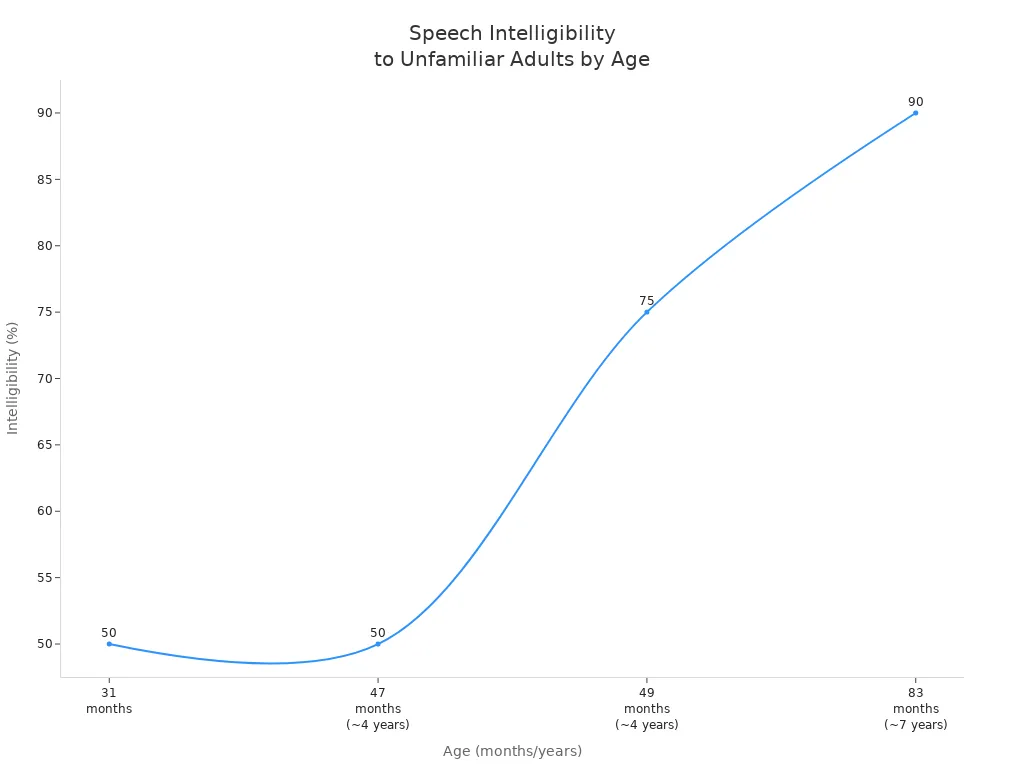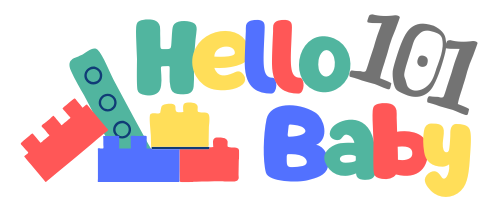You might notice some signs of speech delay in a 4 year old that stand out from other children their age. Here are some of the most common ones:
- Limited vocabulary or trouble forming sentences.
- Speech that is hard to understand, even for familiar adults.
- Using gestures more than words to communicate.
- Difficulty following simple instructions.
- Repeating the same words or phrases often.
Spotting these signs early can make a big difference. Every child grows at their own pace, but if you have concerns, you are not alone. Trust your instincts and reach out for help when you need it.
Typical Speech at Age 4
Vocabulary and Sentences
At four years old, you can expect your child to have a vocabulary of at least 1,000 words. Most children at this age speak in sentences with four or more words.
You might hear them say things like, “I played football at school,” or “I want a blue cup because it’s my favourite.” They start to use connecting words such as “because,” “if,” “and,” or “so.”
You’ll notice your child telling longer stories, answering simple questions, and even recalling parts of songs or nursery rhymes. Their grammar improves, and they begin to use future tense correctly.
If your child struggles to form sentences or mostly repeats the same words, these could be early signs of speech delay in a 4 year old.
- Talks about daily events
- Answers questions like “What is a coat for?”
- Names colours and objects
- Uses sentences with four or more words
- Tells simple stories
Understanding Instructions
By this age, your child should follow two or three step instructions with ease. For example, you might say, “Put your shoes on, grab your bag, and wait by the door,” and your child will know what to do.
They understand simple rules in games and can answer “Who?”, “What?”, “Where?”, and “Why?” questions. If you notice your child often gets confused or only follows part of what you ask, it might be time to look a bit closer.
- Follows multi step commands
- Understands directions in games
- Responds when called from another room
Speech Clarity
Speech clarity makes a big difference at this age. By four, your child’s speech should be easy for you and other familiar adults to understand.
Strangers should understand at least half of what your child says. This clarity keeps improving as your child grows.
Here’s a quick look at how speech becomes clearer over time:
| Age (months/years) | Intelligibility to Familiar Listeners | Intelligibility to Unfamiliar Adults |
|---|---|---|
| 22 months | 50% | N/A |
| 31 months | N/A | 50% |
| 37 months | 75% | N/A |
| 47 months (~4 years) | 100% | At least 50% |
| 49 months (~4 years) | N/A | 75% (by 5 years) |
| 83 months (~7 years) | N/A | 90% |

If you find that your child is still very hard to understand, especially for people outside the family, this could be one of the signs of speech delay in a 4 year old.
Signs of Speech Delay in a 4 Year Old
Not Joining Words
You might notice your child struggles to put words together into sentences. By age four, most children can join words and create sentences of four or more words.
If your child still uses single words or only two word phrases, this stands out as one of the main signs of speech delay in a 4 year old. Children at this age should say things like, “I want juice,” or “Look at my car.” If you hear only “juice” or “car,” it’s time to pay attention.
Not joining words into sentences can signal a delay in language development. This is quite common, affecting up to 12% of children aged two to five. Early support can help your child catch up and avoid frustration or social difficulties later on.
Children who do not join words by age four may find it harder to express their needs and feelings. This can lead to challenges in making friends or joining in at nursery or school.
Unclear Speech
Speech that is hard to understand is another key sign. At four years old, your child’s speech should be clear enough for people outside the family to understand at least half of what they say.
If you find yourself often translating for your child, or if strangers struggle to follow what your child says, this could be a sign of speech delay in a 4 year old. You might hear your child mispronounce words, leave out sounds, or use sentences that sound jumbled.
For example, “thoup” instead of “soup” or “caw” instead of “car.” Some children have trouble forming sentences of the right length or using the right grammar. Their speech may sound sparse or agrammatic, making it difficult for others to understand their stories or ideas.
Here’s a quick look at what unclear speech can look like:
- Frequent mispronunciations or missing sounds
- Short, choppy sentences
- Trouble telling simple stories
- Speech that is hard for strangers to follow
Difficulty Following Instructions
You may notice your child has trouble understanding or following simple instructions. At this age, children should follow two or three step directions, like “Put your shoes on and come to the kitchen.”
If your child often seems confused, only does part of what you ask, or needs lots of reminders, this could be one of the signs of speech delay in a 4 year old.
Children with speech delay might also struggle to learn new words, remember names of letters, or respond to social cues. These difficulties can affect learning and make it harder for your child to keep up at nursery or school. Without early help, your child may fall behind in reading, writing, and social skills.
Early speech therapy can make a big difference, helping your child understand instructions and build confidence in learning.
Limited Vocabulary
A limited vocabulary stands out as another important sign. By four, most children use hundreds of words and can name colours, objects, and people.
If your child uses far fewer words than their peers, or repeats the same words often, this may point to a speech delay. Children who had a small vocabulary at age two are more likely to have ongoing language difficulties at four.
You might notice your child struggles to find the right word, or uses general words like “thing” or “stuff” instead of naming objects. This can make it hard for them to join in conversations or explain what they want.
- Uses fewer words than other children their age
- Struggles to name everyday objects or people
- Repeats the same words or phrases
Preferring Gestures
Some children rely more on gestures than words to communicate. You might see your child pointing, waving, or pulling you towards what they want, instead of saying it out loud.
While gestures are a normal part of early communication, by age four, children should use words as their main way to express themselves.
Preferring gestures over speech can be one of the signs of speech delay in a 4 year old. You may also notice your child avoids eye contact or does not try to communicate verbally or non verbally. These behaviours can signal a need for extra support.
If you notice your child using gestures instead of words, or not trying to communicate at all, trust your instincts and seek advice from a speech and language therapist.
Causes of Speech Delay
Hearing Issues
Hearing is very important for learning to speak. If your child cannot hear well, learning new words is hard. They may not copy how others talk.
Ear wax, ear infections, or fluid in the ear can make sounds unclear. Sometimes these problems go away, but if they happen a lot, speech can be delayed.
If your child does not react to sounds or seems to ignore you, get their hearing checked.
Here is what some studies found:
| Study (Year) | Type of Hearing Loss | Sample Size | Speech/Language Delay Findings |
|---|---|---|---|
| Sedey et al, 2002 | Mild to profound unilateral | 15 children | 27% showed significant language delay |
| Borg et al, 2002 | ≥20 dB hearing loss | 58 children | Delayed language development |
| Kiese Himmel, 2002 | ≥30 dB hearing loss | 31 children | Delayed two word phrase acquisition |
Developmental Conditions
Some children have speech delay because of developmental conditions. These can be genetic, like Down syndrome or fragile X syndrome.
Other conditions, such as autism spectrum disorder, can affect talking and understanding. Oral motor problems, like apraxia or dysarthria, make it hard to move the mouth for speech.
Speech delay can also happen with intellectual disabilities or after a brain injury. Sometimes, doctors do not know the cause. Early help can still make a difference.
- General speech language delay
- Expressive or receptive language disorders
- Autism spectrum disorder
- Childhood apraxia of speech
- Cerebral palsy
Environment
The environment affects how children learn to talk. Children need to hear and use language often. If your child spends lots of time on screens or does not talk much with adults, speech may be slower to develop. Studies show that talking with adults helps the brain grow strong for language.
- Not hearing enough language can slow speech
- Reading, telling stories, and playing help vocabulary
- Supportive parenting helps children talk more
You can help by talking, reading, and playing with your child every day. Even small changes can help a lot!
When to Seek Help
Red Flags
You might wonder when it’s time to get extra help for your child’s speech. Some signs stand out and should not be ignored. If you spot any of these, it’s a good idea to act sooner rather than later:
- Your child struggles to form sentences or answer simple questions.
- People who do not know your child find their speech hard to understand.
- You notice your child gets frustrated or has tantrums because they cannot express themselves.
- Your child does not meet key milestones for their age.
- You feel worried because your child’s speech seems behind compared to other children.
- Your child repeats the same words or phrases but does not add new ones.
- Ongoing problems with vocabulary, sentence building, or making themselves understood.
If you see these signs of speech delay in a 4 year old, trust your instincts. Early support can make a big difference for your child’s confidence and learning.
Getting an Assessment
Taking the first step can feel daunting, but you do not have to do it alone. Here’s what you can do if you have concerns:
- Book an appointment with your GP or health visitor to talk about your child’s speech and language.
- Ask for a referral to a speech and language therapist if your concerns remain after the visit.
- If you still feel worried, seek a second opinion or contact a speech and language therapist directly.
- For children aged three or older, you can ask your local school for a free speech and language check, even if your child does not attend there.
- Look into private therapists if NHS services are not available or you want extra support.
- Do not wait to see if your child will “grow out of it.” Early assessment and help lead to better results.
- Explore free or low cost services through local councils or early years programmes.
Early assessment helps spot any issues that could affect your child’s learning or friendships. You know your child best, so never hesitate to ask for help.
Supporting Your Child
Everyday Tips
You help your child’s speech every day at home. Small changes can really help them improve. Try these ideas to support your child:
- Use self talk by saying what you are doing. For example, say, “I’m cutting the apple,” or “Now I’m washing your hands.”
- Practise parallel talk by talking about what your child is doing. Say things like, “You’re building a tall tower!” This helps your child hear new words and sentences.
- Give your child choices to help them speak. Ask, “Do you want milk or juice?” and wait for their answer.
- Pause and give your child time to reply. Waiting a few seconds can help them find their words.
- Join in with any therapy sessions and do the same activities at home. Doing this often helps your child learn faster.
You know your child best. Your support and patience can help them feel good about speaking and make it more fun.
Play and Reading
Play and reading help your child’s speech grow stronger. You can use daily moments to help them learn.
- Use simple toys like blocks, dolls, or cars. Let your child choose how to play and talk about what is happening.
- Repeat words and phrases while you play together. This helps your child remember and use new words.
- Sing songs and nursery rhymes with your child. The rhythm and repeating words make it easier to learn sounds and words.
- Read aloud every day. Pick books with pictures and ask questions like, “What’s this?” or “What happens next?”
- Try role play or puppets to act out stories. This helps your child use their imagination and practise talking.
| Activity | How it Helps Speech Development |
|---|---|
| Reading Aloud | Builds vocabulary and models sentences |
| Songs & Nursery Rhymes | Improves pronunciation and memory |
| Role Playing | Boosts storytelling and social skills |
| Interactive Games | Encourages turn taking and conversation |
Extra Support
Sometimes, extra help is needed. Speech therapy is the main support for children with speech delay. A speech language pathologist will check your child and make a plan for them.
Therapy uses play, games, and fun activities to build language skills. Some children use extra tools like picture cards or sign language as they learn to speak.
You might also work with other specialists, such as occupational therapists or psychologists, if your child needs more help. Early and regular therapy helps your child make better progress, especially if you use the same ideas at home.
Many parents use online resources, videos, and printable activities. You can find help from websites like Discover Speech Therapy, Speech & Language at Home, and Walkie Talkie Speech Therapy on YouTube. These tools give you ideas and help you support your child every day.
Noticing speech delay early helps your child do well. You can help a lot by getting support when you see signs. Getting help early makes language and confidence much better.
Children who get help at four are often ready for school. They also make friends more easily and feel good about themselves.
- Getting help early improves understanding and talking
- Children feel braver and play more with friends
- Support from family at home helps even more
Listen to your feelings. With the right help, your child can do very well and enjoy learning new things.
FAQ
What if my child mixes up sounds or letters?
You might notice your child swaps sounds, like saying “wabbit” for “rabbit.” This is common at four. If it happens often or makes speech hard to understand, you can talk to a speech therapist for advice.
Can screen time affect my child’s speech?
Yes, too much screen time can slow language growth. You help your child most by talking, reading, and playing together. Try to keep screens for short periods and focus on real conversations.
Will my child outgrow a speech delay?
Some children catch up on their own, but many need extra support. If you feel worried, it’s best to get help early. Early support gives your child the best chance to succeed.
How can I encourage my child to talk more?
You can ask open questions, give choices, and wait for answers. Play together and describe what you both do. Praise your child’s efforts. Reading books and singing songs also help build confidence and vocabulary.



